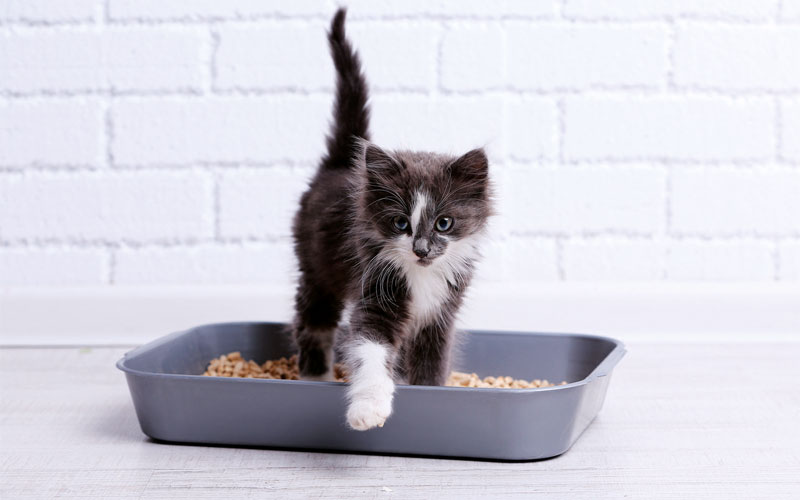When your cat starts urinating on your bed rather than in its litter box, it’s time to address the issue. PETS Magazine shows you how.
Sean Brennan’s cat was 16 years old when she started urinating on his bed.
“I woke up one night and could smell something weird close to my head. I turned the light on and saw Claudette curled up at the end of the bed. This was odd because she never slept there. I ran my hand over the doona and I found a wet patch. It was the last thing I wanted to find at 2am.”
This behaviour was out of character for Claudette so to put his mind at ease, Sean took her to the vet. “She came back with perfect health, which was great, but we were back to square one with the urination problem. Eventually, we narrowed it down to her being very picky about the cleanliness of her litter box. We have to clean it twice or three times a day. If we don’t, we know where she’ll go.”
Potential causes
Feline inappropriate urination is a very common problem faced by cat owners. Veterinarian Dr James Crowley says it can occur for a range of different reasons. “Generally speaking, eliminating outside the litter box can be due to medical conditions, stress-related anxiety or general cleanliness of the box,” he says. Medical reasons can include arthritis, a urinary tract infection, bladder inflammation and urinary stones. If you believe this may be the root of the problem, it’s important to make an appointment with your vet for a physical examination to rule out potential medical causes.
Cats are attuned to stress levels in a household and even small changes to the family routine can cause anxiety. “Household stress can cause anxiety and result in inappropriate elimination,” Dr James says. “Common causes include new animals in the house, new people in the house, conflict between cats within the household or neighbourhood, and even moving furniture.”
Contrary to popular belief, it isn’t just golden oldies urinating outside the box. Younger cats, both male and female, are just as susceptible.
Litter box problems
Believe it or not, the litter tray itself can be the main cause of cats urinating in places they shouldn’t. If you think this may be the cause of your litter box blues, there are a few things you can try:
- Keep clean litter trays throughout the house. If you think the problem could be the type of litter you are using, put a different litter in each tray and see if there is one that your cat prefers.
- If the cat is older or has arthritis, it might be painful for them to use a litter tray with high sides. Switch to a tray with lower sides to see if this helps.
- Some cats develop an issue with the cleanliness of their litter. Fixing this means cleaning the litter box a few times a day and replenishing it with fresh litter.
- Cats prefer to urinate in quiet and private areas of the house. Consider moving the litter to a space that provides this seclusion.
- The type of litter used can also be the cause of the problem. Most cats tend to prefer a non-scented, clay, clumping litter. Not only is this type of litter gentler on the paws, it’s also easier to dig and cover up. The strong perfume scent is more for the cat owner than the cat. Strong scents can repel a cat.
- Some cats even develop a surface or substrate preference, which means they choose places to urinate based on the feeling of certain surfaces underfoot. Some common surfaces or textures that cats may love include curtains, soil and, in Claudette’s case, Sean’s doona.
- Cats like clean litter boxes. Scoop and change litter at least once a day.
- Big litter boxes are preferred, especially for older cats. It gives them plenty of space to enter and move around.
- Cats are not keen on deep layers of litter. Keep the litter shallow and choose the unscented, clumping kind.
- Litter box location is so important. Choose a place that is secluded and quiet but not too far from the hub of the home.
- Don’t keep changing the type of litter you provide. Cats are creatures of habit — once you’ve found the right litter, stick with it.
“If cats are not comfortable with their litter box, then they probably won’t use it,” Dr James explains. “They are creatures of routine and personal preference.”
Litter box 101
Want to know how to get your cat back to loving its litter? Here are five sure-fire ways.
It is stressful and frustrating when your cat abruptly stops using the litter box. “I don’t know how many different things we tried,” Sean says. ”We tried different litter, a calming pheromone, we changed the position of the litter box … We kept Claudette out of the room during the day, but that only made her more determined to get in. We kept her out of the room at night, but she would just scratch all night. Finally, we gave up. Thankfully, we discovered that keeping the litter clean was the answer. We may have to change her litter every day, but we haven’t had to buy any more doonas.”
Written by Kristie Bradfield
Originally in PETS Magazine Issue 65


Leave a Reply